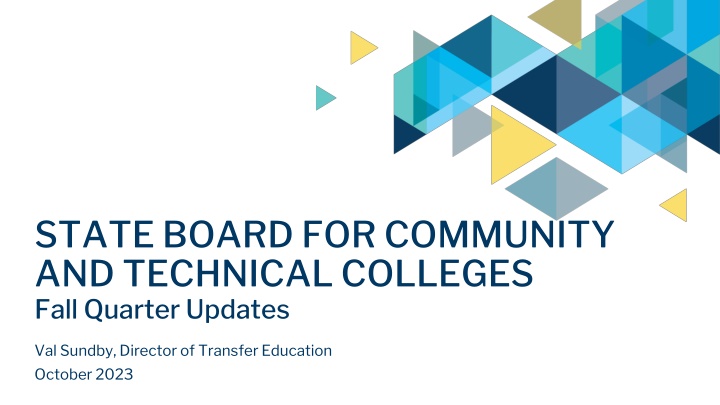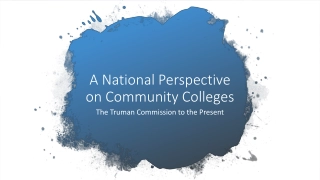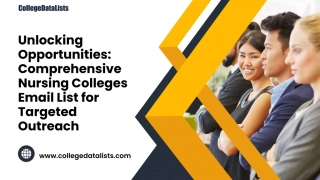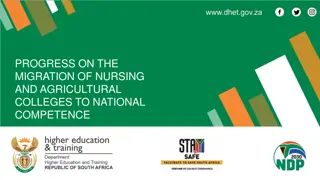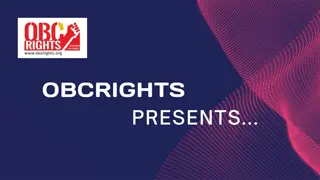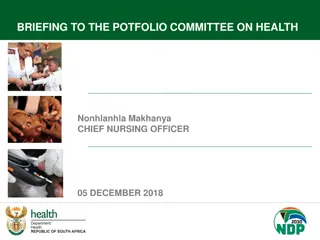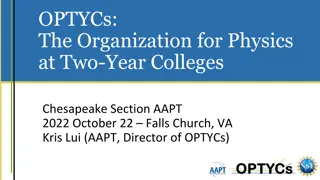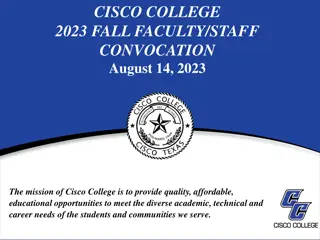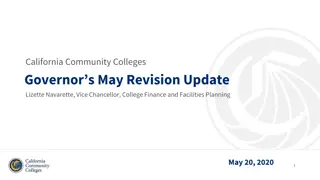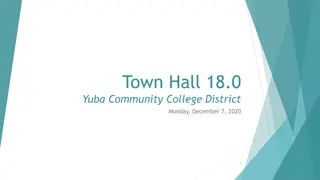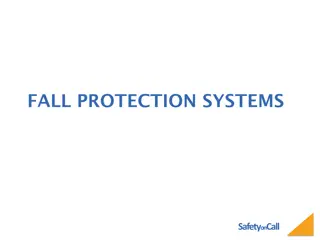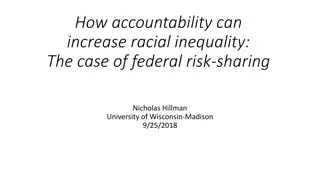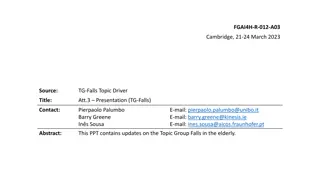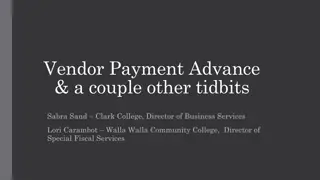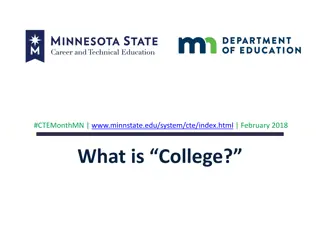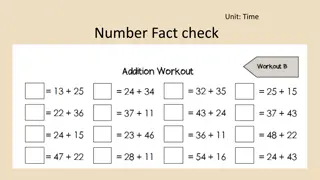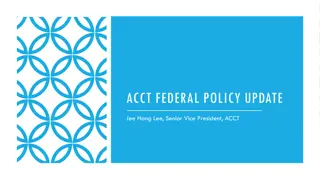Updates and Priorities for Community and Technical Colleges Fall Quarter 2023
Fall quarter updates for the State Board for Community and Technical Colleges include legislative priorities for 2024, student services updates, student success initiatives with guided pathways, and workforce education programs focusing on career launch funds and faculty skill standards. Legislative priorities for the upcoming session include requests to strengthen the computer science workforce, lower professional-technical textbook costs, and invest in college campuses and climate recovery. Student services highlight primary communication methods, mental health counseling pilots, and new initiatives like a student health insurance program. Guided pathways initiatives focus on whole-college reform practices, and workforce education programs are implementing career launch equipment funds and exploring revisions to the funding model.
Download Presentation

Please find below an Image/Link to download the presentation.
The content on the website is provided AS IS for your information and personal use only. It may not be sold, licensed, or shared on other websites without obtaining consent from the author.If you encounter any issues during the download, it is possible that the publisher has removed the file from their server.
You are allowed to download the files provided on this website for personal or commercial use, subject to the condition that they are used lawfully. All files are the property of their respective owners.
The content on the website is provided AS IS for your information and personal use only. It may not be sold, licensed, or shared on other websites without obtaining consent from the author.
E N D
Presentation Transcript
STATE BOARD FOR COMMUNITY AND TECHNICAL COLLEGES Fall Quarter Updates Val Sundby, Director of Transfer Education October 2023
SBCTC 2024 LEGISLATIVE PRIORITIES Supplemental (short) Session 60 days Asks during a supplemental session are generally much smaller and more focused than in a full session Operating Budget Requests Strengthening the Computer Science Workforce - $9M Lowering Professional-Technical Textbook Costs - $600K Capital Budget Requests Investing in College Campuses and Climate Recovery - $103M Energy metering, decarbonization plans, 2 major capital projects (LCC and CBC) 2
STUDENT SERVICES Primary communication for Student Support Programs (WorkFirst, BFET, SSEH, and SEAG programs) is via Canvas; contact your SBCTC program administrator for access Mental Health Counseling Pilot will continue through June 2024 YVC and SPSCC are piloting a Student Health Insurance program SBCTC is participating with WSAC in a SHEEO ASAP grant to explore feasibility of the ASAP model (project colleges include CPTC, PC, and Spokane District) New FAFSA is delayed originally expected 10/1, now by end of the year 3
STUDENT SUCCESS GUIDED PATHWAYS CCRC Report Whole-College Guided Pathways Reform Practices: Scale of Adoption by Community Colleges in Three States Guided Pathways Advisory Council Meets quarterly and is now reports to the Education Services committee at WACTC Instruction has 2 representative (Kerry Levett and TBD) The Guided Pathways Peer and Professional Learning Calendar has been updated for the 2023-2024 academic year. Lots of Math placement and progression work happening! Assessment Teaching and Learning (ATL) Conference is back! May 2-3 at Yakima Convention Center 4
WORKFORCE EDUCATION Career Launch Equipment Funds $5M in funds will be allocated through a competitive grant process with the first round of requests opening October 19th and closing November 30th. CTE Dual Credit Two-year pilot is underway - this pilot specifically focuses on the region served by four of our system colleges (Whatcom, Bellingham Tech, Skagit Valley, and Everett) and NWESD 189. Professional/Technical Faculty Skill Standards This work is in it s final stages (led by WEC) Worker Retraining Funding Workgroup Exploring potential revisions to the funding model 5
BASIC EDUCATION FOR ADULTS Ability to Benefit The Washington state Ability to Benefit (ATB) State Option has been renewed for a five-year period. Through this option, students can co- enroll in an I-BEST and High School+ program and receive state and federal financial aid, including the Washington Grant and Pell Grant. Antiracist Curriculum and Assessment Project BEdA engaged in an antiracist curriculum and assessment project, AntiColoniality in English Language Acquisition (ELA). The project wrapped up offering a repository of scholarship on anticoloniality in English teaching and education complete with a OER (Open Educational Resources) ELA instructor s resource guide. 6
DUAL CREDIT Running Start Substitute House Bill (SHB) 1316 increased the combined monthly full- time equivalent (FTE) and annual average FTE (AAFTE) enrollment limit from 1.20 to 1.40 and directed OSPI to adopt rules to allow participation in Running Start during the summer term. College in the High School Substitute Senate Bill (SSB) 5048 Eliminates College in the High School fees for all students in 9th grade through 12th grade that attend a public high school or charter school and are enrolled in a public institution of higher education. Fall Transfer Fairs returned this year! The Washington Council for High School-College Relations (WCHSCR) 7
EDUCATIONAL TECHNOLOGY WA CTC students save $20 million over the past 2 years with the implementation of OER and low-cost labeling policies. New content added to the WA Checklist Guides Section 1: Sense of Belonging & Student Engagement Canvas Credentials As of July 30th, all campuses have access to the Canvas Credentials badging platform. Canvas Credentials - Annual Status Report 06.30.23 8
TRANSFER EDUCATION Climate Solutions Not advanced in supplemental budget; working on strategies to continue the work New Proposed Computer Science Transfer Degree The feedback on the AS-T 3 went back to JTC; the workgroup is coming back together on next steps WA45 Going to IC for review/approval (edits from the BIs have been approved by ATC) PreNursing Degree review coming soon! 9
OTHER STATEWIDE WORK RELATED TO TRANSFER Course Sharing ACPL JTC Workgroups DTA revision and Student Transfer Experience 10
BS/CS CURRICULUM RETREAT November 15-17 at Alderbook Retreat Center Faculty focused Combine information gathered at the two statewide convenings (as well as the work done to date by AppConnect) to inform curriculum development for a CS core that could be common across colleges 11
PROGRAM STATISTICS 157 approved bachelor degree programs at 33 colleges, including 9 Bachelor of Science in Computer Science Programs 4,357 FTES in baccalaureate-level courses during the 2022- 23 academic year representing 4.6% of state support FTES This represents a small baccalaureate FTE decrease over the previous year (-434 FTES). The decline is expected due to enrollment declines in the associates degree programs that serve as feeder programs for these degrees. Enrollment numbers in BAS program appear to be stabilizing and have not decreased as steeply as declines in workforce associate degree programs
PROGRAM STATISTICS Fall to Fall retention for all students remains high at 72%. Black or African American students - 76% (n=115) Hispanic students - 72% (n=175) American Indian/Alaska Native 55% (n=11) Native Hawaiian or Other Pacific Islander 85% (n=13) Two or more races 66% (n=265) Four-year completion rate is 70% 69% of students are employed 3 years after enrollment and earn a median wage of $54,000. By 5 years out, the wage increases to $66,000. Business Management, Information and Technology, and Health Care, and Education are the highest enrolled program areas, with 65% of Baccalaureate enrollments. 47% of CTC Baccalaureate students received some form of need-based
QUESTIONS? Val Sundby Director of Transfer Education vsundby@sbctc.edu
